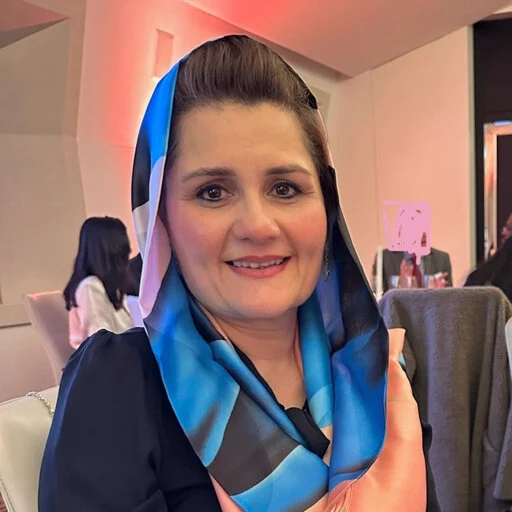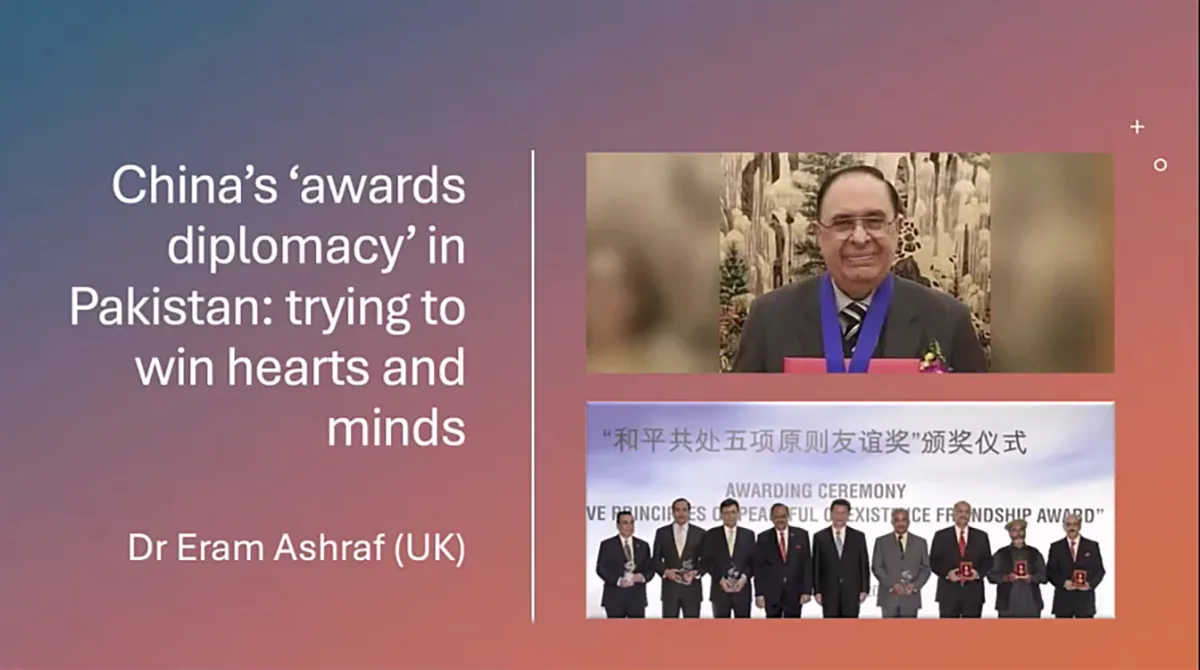
Dr. Eram Ashraf
Eram Ashraf holds a PhD in International Relations from Swansea University, UK, where she currently resides. Her doctoral research explored societal security, social identity, and the Uyghur millat/minzu.Her current work focuses on China-Pakistan relations, particularly the China-Pakistan Economic Corridor (CPEC) within the Belt and Road Initiative (BRI), with a special interest in the role of gender and regional dynamics.
Introduction
My talk today fits very well with the soft power dimension discussed by Professor Nuruzzaman, particularly regarding China’s activities in Pakistan. I will focus on a niche area: China’s awards diplomacy in Pakistan—an effort aimed at winning hearts and minds.
Let me begin with a visual reference. In one image, you see Professor Atta-ur-Rahman, a renowned chemistry professor, receiving medals for his scientific contributions. In another, taken during President Xi Jinping’s 2015 visit to Pakistan, you see the presentation of Friendship Awards to various Pakistani entities.
Two Categories of Awards
For clarity and brevity, I divide Chinese awards into two broad categories:
- CPEC-Related Awards
- Non-CPEC Awards
CPEC-Related Awards
These are linked to the China-Pakistan Economic Corridor (CPEC), the flagship project of China’s Belt and Road Initiative in Pakistan.
One notable award is the Outstanding Pakistani Employee of CPEC Project, which recognizes Pakistani workers contributing significantly to CPEC. In 2020, 18 recipients were selected during an online ceremony due to COVID-19. However, none were women. This gender gap led to my publication in the Routledge book – China-Pakistan Relations, Gender and the China Pakistan Economic Corridor – last year, highlighting how this game-changing project had little to offer Pakistani women.
In subsequent years, one woman was selected in the second ceremony, and three by the end of 2022. Interestingly, in 2023, the award ceremony was not publicly announced. This coincided with a change in China’s ambassador to Pakistan—Ambassador Nong Rong’s term ended in December 2023, and the new ambassador had not yet assumed office.
I’ve created a database of Chinese awards given to Pakistani citizens, relying on publicly available English-language sources. In 2022, these awards were widely publicized, including in Pakistani newspapers. But in 2023, the publicity diminished. Individual companies like the China Overseas Port Holding Company (COPHC) in Gwadar conducted their own awards, selecting 17 recipients. However, embassy-hosted events were no longer publicly visible.
CPC Media Forum Golden Anchor Awards
This is perhaps the most significant award. The CPC Media Forum was established in 2015 by the Chinese Embassy and the China-Pakistan Institute, led by Senator Mushahid Hussain. In 2018, the forum began awarding journalists and media outlets that portrayed China and CPEC positively.
The first award was given to Ms. Numra Asif, the first and only Pakistani woman to receive a Chinese award in this category. So far, five award ceremonies have been held. These awards are organized by China Economic Net, a state-affiliated media outlet, in collaboration with Pakistani judges. They recognize both Pakistani and Chinese journalists who promote positive narratives about China and CPEC.
I recently published a report, China’s Awards Diplomacy in Pakistan: Gaining Goodwill, with the Center for Economic and Social Progress (CSEP) , analyzing this award diplomacy . Notably, the awards began in 2018, coinciding with the rise of Prime Minister Imran Khan’s PTI government, which was initially skeptical of CPEC. These awards seemed to counter negative media narratives and promote favorable coverage.
Non-CPEC Awards
These awards are given to individuals not directly involved in CPEC projects. Based on my database of 215 Pakistani recipients, I categorized them by professional background:
- Media: 45% (journalists, editors, media owners)
- Think Tanks: 14% (directors, researchers publishing pro-China content)
- Education: Professors and academic directors
- Natural Sciences: 10% (e.g., Professor Atta-ur-Rahman)
- Business: 10%
- Miscellaneous: Includes individuals like Ahmed Ali Jan, caretaker of the Chinese graveyard for workers who died building the Karakoram Highway.
These awards primarily target those who disseminate positive stories about China, helping build goodwill for China and CPEC within Pakistan.
Why This Matters
CPEC hasn’t always enjoyed a rosy image. Issues like transparency, employment distribution (Chinese vs. Pakistani workers), and debt diplomacy have sparked criticism. In this context, it makes sense that China focuses its awards on media, think tanks, and education—sectors that shape public opinion.
Conclusion
In the past decade, 215 Chinese awards have been given to Pakistani citizens. These awards are not only from the Chinese Embassy but also from Chinese companies and consulates in Lahore and Karachi. In 2023, consulates awarded up to 50 individuals—far more than in previous years.
This shows that for China, opinion makers and knowledge disseminators—especially those promoting a positive image of China and CPEC—are crucial. Hopefully, this helps you understand how Chinese awards diplomacy is shaping perceptions and fostering influence in Pakistan.
Thank you.

Dr. Eram Ashraf
Eram Ashraf holds a PhD in International Relations from Swansea University, UK, where she currently resides. Her doctoral research explored societal security, social identity, and the Uyghur millat/minzu.Her current work focuses on China-Pakistan relations, particularly the China-Pakistan Economic Corridor (CPEC) within the Belt and Road Initiative (BRI), with a special interest in the role of gender and regional dynamics.
“These views belong to the author and do not reflect the views of the Policy Research Institute for South Asia (PRISA) or its team.”
Table of Contents
Toggle

